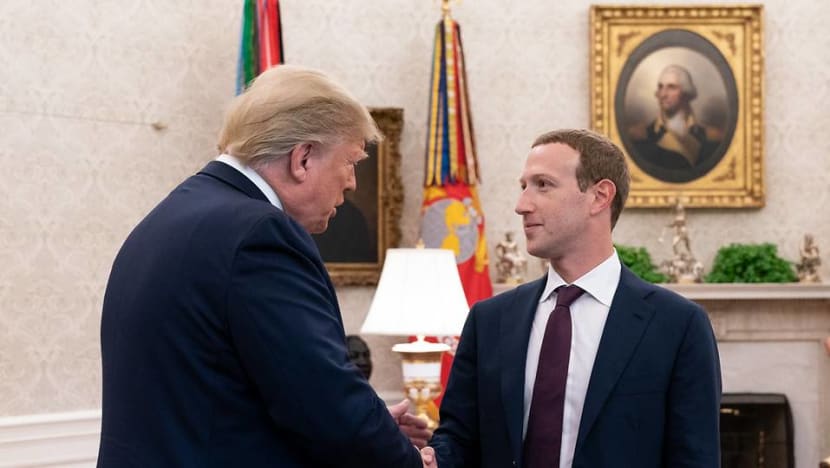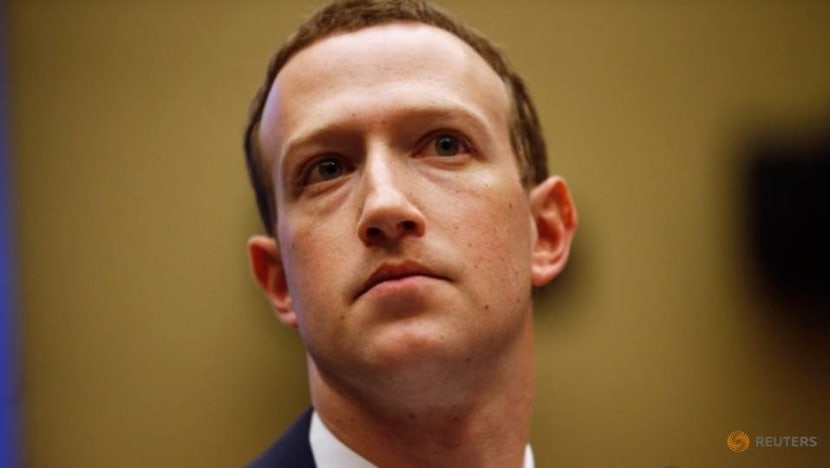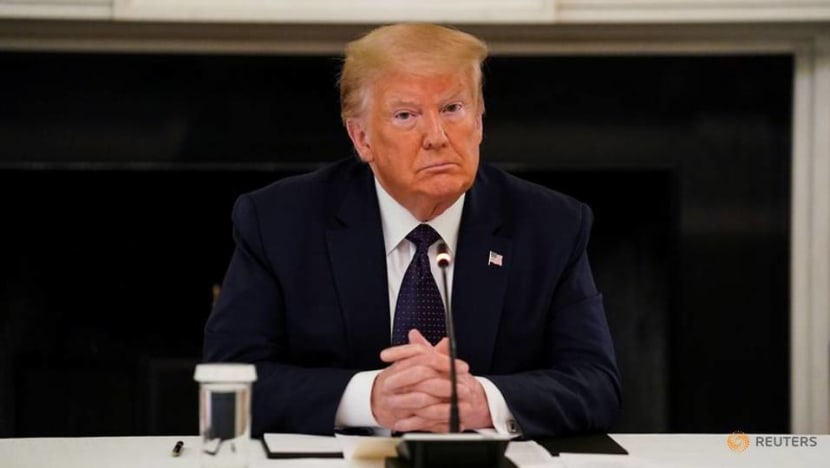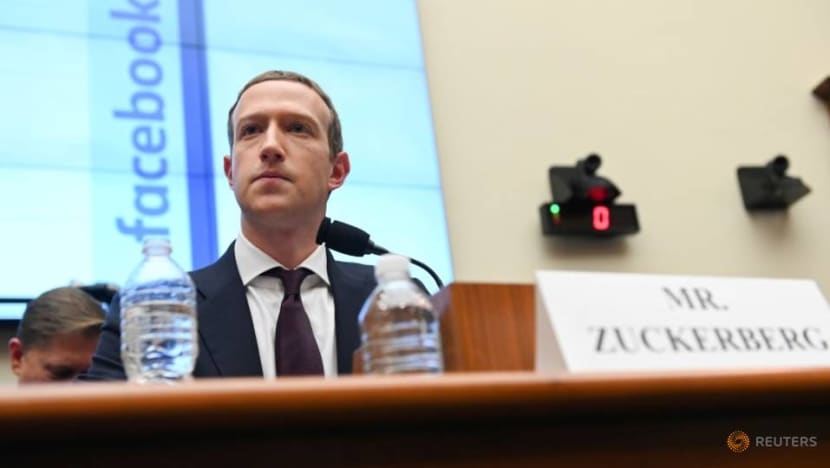commentary Commentary
Commentary: Is Facebook cosying up to US President Donald Trump?
Facebook’s founder offers a principled defence of his decision to leave up a Donald Trump tweet about looting in the aftermath of protests against George Floyd’s killing, but the circumstances raise doubts, says Mark Cenite.

Facebook chief Mark Zuckerberg met US President Donald Trump and members of the Congress on Sep 19, 2019. (Photo: Twitter/realDonaldTrump)
SINGAPORE: There are two interpretations of Facebook CEO Mark Zuckerberg's decision to leave up US President Donald Trump's recent post about protests over George Floyd's killing, and Zuckerberg’s subsequent promise of a policy review.
One is that Zuckerberg is a principled advocate of free expression struggling with a hard case.
The second is that the billionaire is bending principles to avoid crossing Trump, out of fear of Trump’s bluster about retaliation against Big Tech.
A SWIFT U-TURN?
Early on Friday morning (May 29), Trump cross-posted to Twitter and Facebook about violent protests against the police killing of George Floyd: “These THUGS are dishonoring the memory of George Floyd, and I won't let that happen. Just spoke to [Minnesota] Governor Tim Walz and told him that the Military is with him all the way. Any difficulty and we will assume control but, when the looting starts, the shooting starts."
Twitter labelled it as “glorifying violence”, but Zuckerberg announced that the post would stay on Facebook. Hundreds of Facebook employees staged a virtual walkout of work. Some took to Twitter to express disagreement, even shame.
Zuckerberg told some 25,000 Facebook employees on Tuesday he had decided the post did not violate Facebook’s content guidelines but he had voiced concerns about it to Trump himself.
READ: Commentary: Twitter may have just helped Trump get re-elected
READ: Commentary: Could Donald Trump not run for re-election?
Zuckerberg then blinked on Friday, when he announced a policy review and opened the possibility of applying labels to posts, as Twitter had done.
MARK, THE MAN OF PRINCIPLE?
For years, Zuckerberg espoused something close to an absolutist approach to free speech. His remarks echoed centuries-old arguments that in an unregulated clash of truth and falsehood, truth wins.
It's a rationale that underlies the United States Constitution's First Amendment protection for free expression. And though that amendment only limits government censorship — not how Facebook, a private company, can restrict speech — Zuckerberg has explained that the platform applies similar principles.

One exception to the First Amendment is that incitement to violence can be prohibited, but it’s defined so narrowly the test is almost never met. Facebook prohibits incitement, though it’s not clear its definition is the same. Zuckerberg noted that unlike on Twitter, even incitement in newsworthy posts of political leaders is barred.
But Trump’s post wasn’t incitement, Zuckerberg said.
In the leaked transcript of Zuckerberg’s meeting with Facebook employees, he explains how, in the hours after Trump's post, he considered three interpretations of the “looting-shooting” comment.
The first interpretation, which Trump would later embrace: Trump was merely observing or predicting that where looting occurs, shooting may occur. He was not encouraging shooting.
The second interpretation: Trump was encouraging police or ordinary citizens to shoot looters. If this were the case, the post could violate Facebook’s incitement ban, depending on how strictly it defines incitement.
The phrase has a history. A notorious Miami police chief first said it in 1967 about civil rights protests, adding that he didn't mind accusations of police brutality. Others segregationist leaders spoke of shooting looters.
Zuckerberg said he considered suggestions that Trump’s use of the phrase could be a signal — a "dog whistle” that only those who know the history would hear — to take justice into their own hands.
But he told his employees that in the past, the “looting-shooting” phrase has referred to “aggressive policing — maybe excessive policing — but has no history of being read as a dog whistle”.
READ: Commentary: So much wrong in US response to George Floyd protests
READ: Commentary: Why George Floyd's death could tilt the US election - in Trump's favour
The third interpretation: The remark discusses or warns about the state's legal use of force. That's permissible under Facebook's guidelines.
Zuckerberg claims that after consulting his team and external civil rights advisers, he concluded that the third interpretation was the most reasonable. He knew his decision would upset many.
Then last week, in Zuckerberg’s telling, he met his upset employees halfway. He acknowledged the need for a review of deeply held principles to meet the challenges of these restive times.
MARK, THE OVERLY CAUTIOUS BUSINESSMAN?
Zuckerberg had a telephone conversation with Trump on the day he decided to keep up the post. If only we could hear that exchange. But with swords hanging over Facebook, maybe few words were necessary.
Trump has been threatening social media for years.
READ: Commentary: Help, I love tech monopolies!

The day before their conversation, Trump had retaliated against Twitter's decision to flag two of his tweets as misleading. Trump had issued an executive order initiating a review of a decades-old law, Section 230 of the Communications Decency Act, that protects social media platforms from liability for most content we users post.
In recent years, Trump has also raised the spectre of antitrust action against Facebook, Amazon, and Google.
In 2018, Trump said, "I do have a lot of people talking about monopoly when they mention those three". He said they may be in “a very antitrust situation”.
He said his administration is “looking at” antitrust action against “all three”, adding, “that doesn't mean we're doing it, but we're certainly looking”.
In the worst-case scenario, antitrust enforcement could force Facebook to let go of Instagram and WhatsApp, leaving Zuckerberg with a fraction of his empire.
READ: Commentary: COVID-19 online shaming and the harm it can cause
READ: Commentary: On social media, life amid coronavirus risks becoming a popularity contest
In 2019, Trump’s Justice Department and the Federal Trade Commission announced probes into tech platforms, without naming which ones. The Wall Street Journal reports that the Justice Department may initiate proceedings against Google in the months ahead.
If Zuckerberg is reacting to Trump’s sabre-rattling, he is being exceedingly cautious. Trump’s threats to Facebook’s bottom line, even its existence, are grave, but his chances of successfully executing them are remote.
Government closure of tech platforms would violate the First Amendment. Removing their immunity or breaking them up is not directly within Trump’s power.
Meanwhile, Zuckerberg must placate another group. Facebook can't innovate without top talent, who can easily find jobs elsewhere. Last week, with staff in revolt, the pressure to announce a policy review became a business imperative. This week, some Facebook moderators penned an open letter supporting the walkout.
Maybe even Trump would understand Zuckerberg’s announcement. After all, he made no promises about the review’s outcome.
WHICH MARK IS IT?
In the meeting with his staff, Zuckerberg comes across almost as a judge, parsing the precise meaning of Trump’s words and balancing principles of free expression and the harm it may cause.

Still, Zuckerberg didn’t address a complication: Shooting looters is generally illegal.
Observers have suggested it was convenient for Zuckerberg to reach the conclusion that avoids antagonising Trump. It’s not the first time critics questioned Facebook’s motives for leaving up Trump’s incendiary and false content, ranging from anti-immigrant remarks in the 2016 election campaign to its decision this year not to fact-check political ads.
Facebook’s track record and incentive structure when principles conflict with the bottom line do not bode well.
Facebook makes 98.5 per cent of revenue from advertising. Its strength is its ability to target ads to us based on the spectacular amount of data it gathers as it tracks us.
READ: Commentary: The world's most powerful teenager? Facebook
READ: Commentary: Big Tech’s growth spurt may be coming to an end
In 2011, Facebook settled US Federal Trade Commission charges that it deceived users about privacy and promised not to do it again. Yet in 2019, the US Federal Trade Commission fined Facebook US$5 billion for again deceiving users about privacy.
Now Facebook is facing legal action for not complying with a requirement to get users’ explicit consent for how it handles our data under the European Union's General Data Protection Regulation.
Next time, if Zuckerberg decides to leave Trump’s posts up, unlabelled, it may be because Zuckerberg judiciously applied principles and found free expression outweighs potential harm.
Or it may be to fend off the president’s threats to his empire.
Dr Mark Cenite is Associate Dean (Undergraduate Education) of the College of Humanities, Arts and Social Sciences at Nanyang Technological University. He teaches classes on the law of communication and artificial intelligence.















